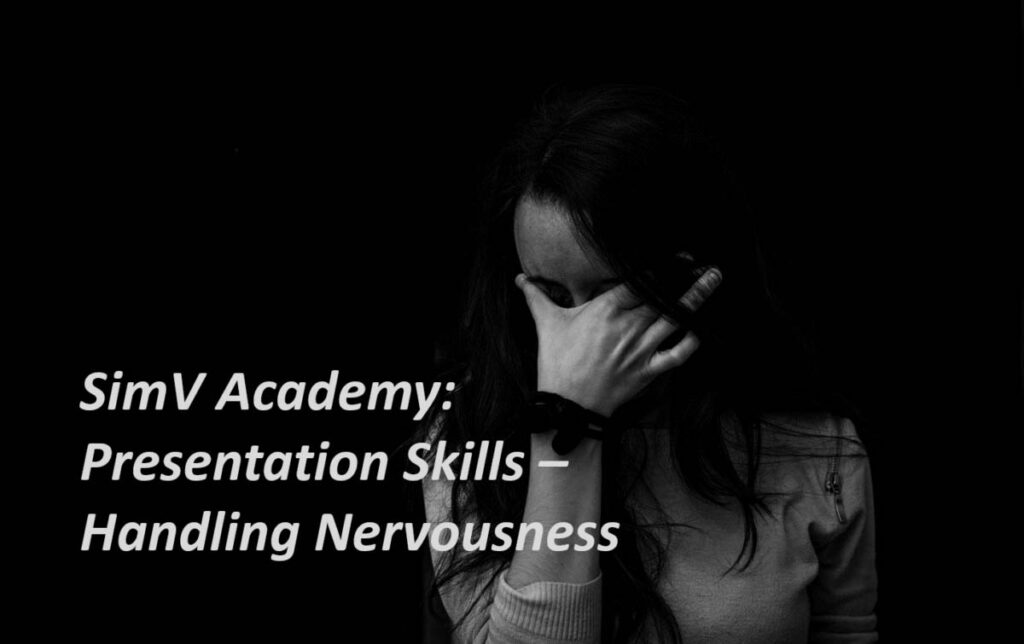By Jason Rachanow and Taylor Duffy
Public speaking can cause fear of rejection, judgement, failure, and more. Approximately 75% of the population suffers from Glossophobia, the fear of public speaking. Even Harrison Ford, the actor who plays Indiana Jones, has Glossophobia. He once half-jokingly said, “It’s people I’m scared of,” not the snakes or rats.
Jason Rachanow led the 5th and final SimV Academy for the “Presentation Skills” series, speaking on “Handling Nervousness when Presenting.” He told the class about the mental and physical symptoms that accompany nervousness and how to combat them.
Here are the 5 main internal symptoms of nervousness and methods for dealing with them:
- Catastrophizing: This is thinking the worst possible scenario will happen. Try meditating or breathing exercises. There are plenty of videos and apps that you can download that instruct you through the exercises.
- Rapid Heart Rate: Meditation and breathing exercises can also help with this problem. Having a rapid heart rate is normal. The excitement that you feel can bring energy to your presentation.
- Brain Fog: Sometimes being nervous can cause you to forget your information. The more you practice, the better off you will be. Try coming up with memory tricks that connect new information to long term information using visuals. There are tons of resources on this online!
- Nausea/Stomach Issues: Make sure you eat the day of your presentation but avoid eating a full meal right before. Be aware of what causes you to have stomach issues such as lactose intolerance, food allergies, unhealthy foods, etc. Staying hydrated will help, and if that is not enough, ginger and mint can help as well.
- Dry Mouth: Suck on a lemon or a sour candy before you present. This will activate salivation. During your presentation, even just thinking about the sour taste you had previously will trigger your mouth to salivate. Remember to keep a bottle of water close so you can have something to drink during your presentation. Using lip balm with glycerin will also promote longer lasting moisturizing effects.
Here are the 3 main external symptoms of nervousness and methods for dealing with them:
- Altered Voice: Your voice can come out shaky, you can mispronounce words, you can mumble or talk too softly, and more can change with your voice when you are nervous. Breathing prior to the presentation, standing up straight and intentionally speaking from your diaphragm will help with this. Saying tongue twisters prior to your presentation will help with annunciation. Pay attention and use verbal pauses instead of Um’s, So’s, etc.
- Hand Movements: Your hands can become shaky or you can exaggerate hand movements when you are nervous. Try holding on to something that won’t give away your shakiness or place your hands on the podium if there is one. Scrunching your toes during the presentation will also help relax shakiness in the rest of your body.
- Pacing: It is good to have a little bit of movement while you are presenting, but too much can become distracting and appear erratic. This can even cause you to sweat, making you look even more nervous. Think about moving with intention, and if that is too much to think about, then set boundaries for you to move within.
There are many ways to overcome the symptoms of your nerves, eventually curing your nerves altogether. The best thing you can possibly do to cure your nervousness is to practice, practice, practice. There’s nothing better to boost your confidence than knowing your material. The more confident you are, the less the symptoms of nervousness will manifest. Join the Rotary Club or Toast Masters to have a platform to practice. Practice in front of the mirror, your family, or even your pet!
Through years of practicing, Harrison Ford learned how to control his nerves while public speaking. He said that although he still gets a little nervous, it is nothing compared to how it was before. There is a very noticeable difference in him when he first got in front of an audience versus now. If he can tackle his nerves through practicing and learning how to control them, so can you!
